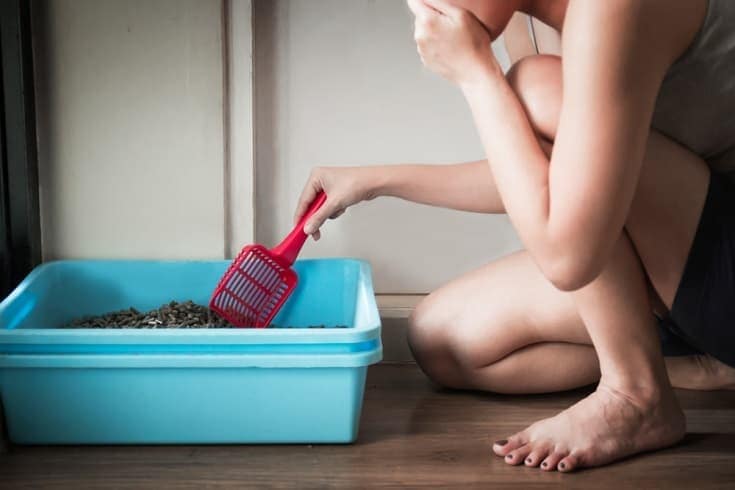
If your litter box is smelling a little ripe, it might be more than just the everyday cost of being a cat owner. Strong smells can be a sign that something needs to change in your cat’s diet or litter. This can also be a sign of health issues that may require veterinary attention.
Either way, it’s important to get to the bottom of it. In this article, we’ll take you through 10 of the most common reasons your cat may have a smelly stool.
The 10 Reasons Why Your Cat’s Poop Smells So Bad
1. Poor Diet
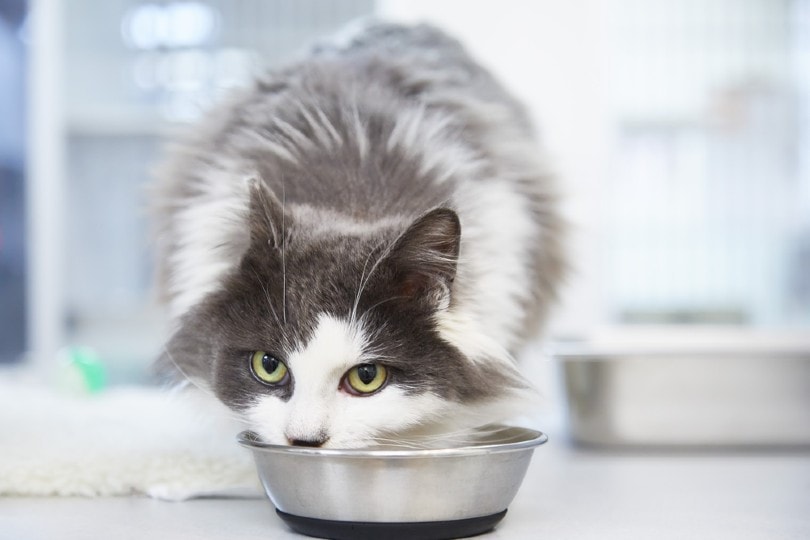
Good food works wonders on a cat. But, if they are eating low-quality food or are eating too much, stinky stool might be the result. This can be accompanied by weight gain or excessive hunger.
Possible Remedies
Give your kitty an upgrade! High-quality food can be expensive, but there are many options out there for affordable prices. Work with your veterinarian to pick out the right food for your feline friend.
2. Food Intolerances
Not every cat has the same stomach, and not every food is right for every cat. Food intolerances can lead to diarrhea, constipation, and stinky stool. There are a few things that cats are generally intolerant to, like lactose. Your kitty might also have an allergy or intolerance to something more unusual, like certain types of protein.
Possible Remedies
A new diet may be key here too. It may be as simple as finding a food that doesn’t contain the possible culprit. Again, it’s best to consult with your veterinarian if you think your cat may be experiencing a food intolerance.
3. Digestive Issues
Even if your cat does not have any specific food intolerances or allergies, some cats have more sensitive stomachs than others. Frequent diarrhea and constipation can be a sign of sensitivity, especially if you’ve eliminated allergens as a cause. These cats usually need food formulated for sensitive stomachs or other medications that help keep them healthy.
Possible Remedies
Try a cat food formulated for sensitive stomachs. A consultation with a vet can also help you find a good solution for your cat’s stomach sensitivity.
Pet parents are faced with a few challenges when it comes to selecting new food and water bowls for their feline companions. The Hepper NomNom Cat Bowl combines cat-friendly features, such as shallow bowls and slight elevation that promote whisker relief, good posture, and digestion, with a beautiful modern design geared to keep floors free of mess during meal time. This bowl is entirely dishwasher safe, making life as a pet parent as simple as possible. Click here to learn why the Hepper NomNom Cat Bowl is right for you and your cat.
At Pet Keen, we’ve admired Hepper for many years and decided to take a controlling ownership interest so that we could benefit from the outstanding designs of this cool cat company!
4. Wild-caught Food
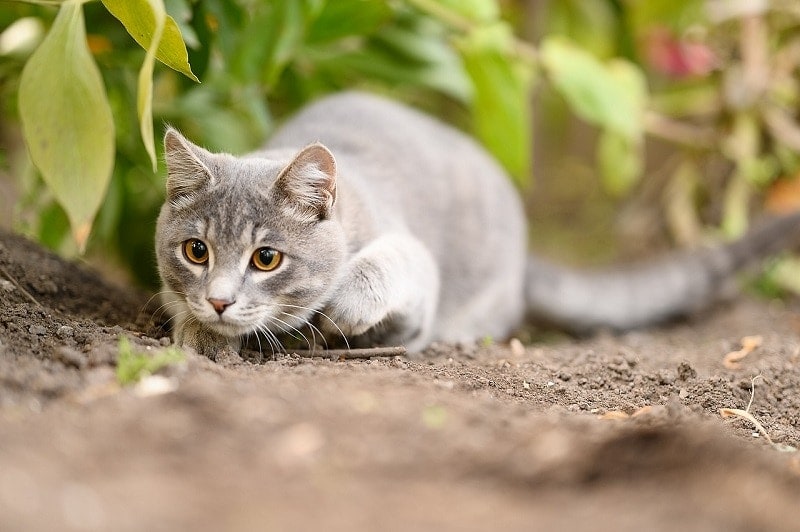
An overabundance of lean proteins can lead to a ripe smell, and if your cat eats a lot of wild animals like birds and rodents, you might notice it. This smell is not necessarily a sign of poor health, but it isn’t very pleasant for us either!
Possible Remedies
Try to limit your cat’s outdoor time to supervised intervals. A collar with a bell can help keep your cat’s success down, but don’t rely on it! Many bell-wearing cats learn to hunt around it.
5. Dirty Litter Box
Sometimes, the smell isn’t necessarily a result of diet or a health problem, it’s a reflection of the litter box. Litter boxes that aren’t properly cleaned out can lead to strong smells over time.
Possible Remedies
Make sure you clean out the litter box every few days and change out the litter every few weeks. Occasionally scrub down the bottom of the box as well. Check out self-cleaning litter box options that might help reduce cleanup time. Don’t forget to check areas around the box in case your cat has left a mess somewhere you didn’t notice.
Wondering whether an enzymatic spray or deodorizing powder is better at fighting pet odors? Compare Hepper's Pet Stain & Odor Eliminator Spray to their Litter Deodorizer Powder to see which product is best for your deodorizing needs.
 |
 |
|
|---|---|---|
| Hepper Advanced Bio-Enzyme Pet Stain & Odor Eliminator Spray | Hepper Advanced Bio-enzyme Deodorizer & Litter Additive | |
| Eliminates smells |
Eliminates smells:
|
Eliminates smells:
|
| Removes stains |
Removes stains:
|
Removes stains:
|
| Powdered/dry form |
Powdered/dry form:
|
Powdered/dry form:
|
| Liquid/wet form |
Liquid/wet form:
|
Liquid/wet form:
|
| Works on a variety of surfaces |
Works on a variety of surfaces:
|
Works on a variety of surfaces:
|
| Works inside your cat's litter |
Works inside your cat's litter:
|
Works inside your cat's litter:
|
At Pet Keen, we’ve admired Hepper for many years, and decided to take a controlling ownership interest so that we could benefit from the outstanding products of this cool cat company!
6. Poor-Quality Litter
Like food, not all litter is created equal. Some types of litter are better at absorbing smells than others, and cheap litter can lead to a strong stench. Unscented cat litter and litter without odor controls are the biggest culprits.
Possible Remedies
Look for a litter brand that is scented and has odor-controlling ingredients like baking soda. Consider switching to a different litter brand if what you have isn’t working for you.
7. Medications
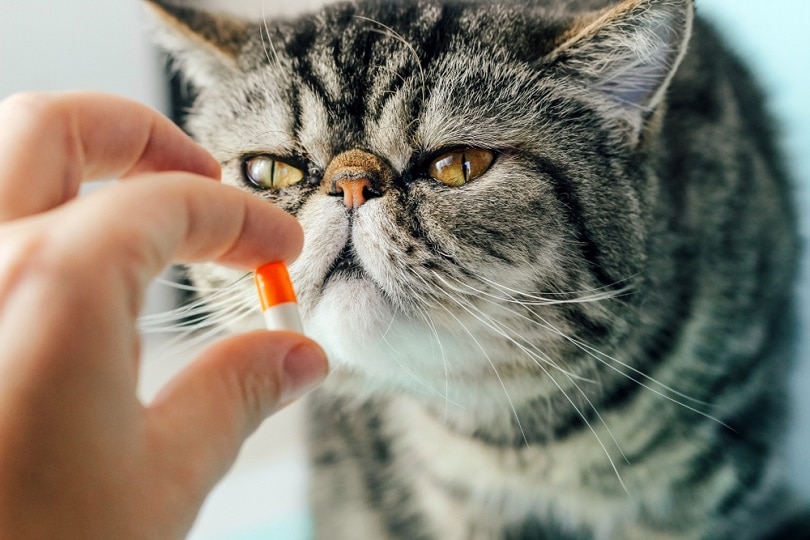
If your cat is on any medications, they can affect the smell of your cat’s poop. This isn’t necessarily a sign that something is wrong, but you can always reach out to your vet if you have concerns.
Possible Remedies
If your cat’s medications are causing smelly stool, you might want to ask if there are any other alternatives. But some smells are unavoidable. If your cat is on medication for a short period, hopefully the smell will only be temporary.
8. Bacteria or Parasites
If your cat eats something that is full of bacteria or parasites, smelly stool might be the result. Parasites and bacteria are often caused by eating wild-caught food. Bacteria like E. coli and Salmonella, as well as many intestinal parasites, can be behind this smell. Sometimes other signs of sickness are present as well.
Possible Remedies
Contact your veterinarian if you notice any change in the smell and consistency of your cat’s stool. They may want to test them for bacteria and intestinal parasites.
9. Intestinal Bleeding
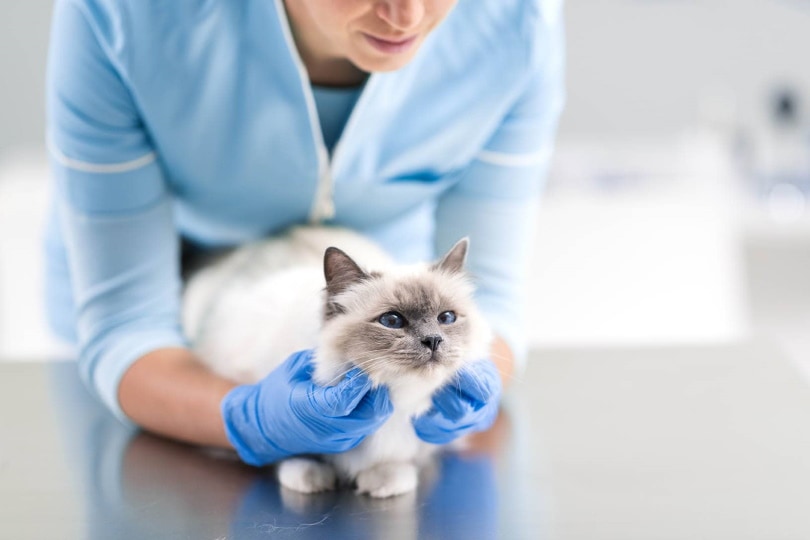
If your cat has intestinal bleeding, you’ll likely notice a bloody discharge or poop with a sharp, metallic odor. Intestinal bleeding can be a sign of various health issues, from a digestive issue to an injury. Please seek veterinary care if you notice any blood in your cat’s stool.
Possible Remedies
Please have your cat evaluated by a veterinarian to determine the cause of the bleeding.
10. Anal Gland Infection
Cats occasionally get anal gland infections that lead to a foul-smelling discharge. This discharge is usually not confined to the litter box, and will leak from your cat without bowel movements.
Possible Remedies
If you suspect your cat has an infection, have them evaluated by your veterinarian. Treatment may include flushing out the blocked anal glands, and medication to help treat the infection.
Final Thoughts
Smelly poop can be annoying. But more than that, it can be a sign of a serious health issue for your cat. It can take some patience to determine the cause of the strong odors, but it’s worth the time and effort to make sure your cat is healthy and happy.
You may also be interested in:
- Cat Not Covering Its Poop? 7 Reasons Why (& How to Help)
- Why Do Cats Poop on Grass and How Can I Stop It?
- Why Do Cats Poop When They Are Scared? 3 Possible Reasons
Featured Image Credit: catinsyrup, Shutterstock







